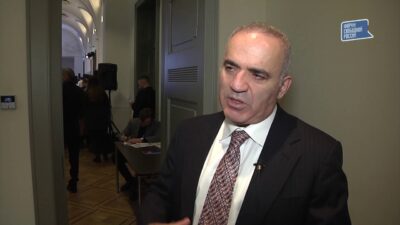Ukrainian President Volodymyr Zelenskiy has met with a group of ambassadors from the Group of Seven (G7) and the European Union to defend his government’s decision to shut several television channels controlled by a Russia-linked magnate, a move supported by Washington but questioned by Brussels and slammed by Moscow.
Zelenskiy told the group in Kyiv on February 3 that the decision to block the 112, NewsOne, and ZIK channels was justified by the need to “fight against the danger of Russian aggression in the information arena.”
Relations between Ukraine and Russia deteriorated in 2014 after Moscow annexed the Crimean Peninsula and began supporting separatists in eastern Ukraine. The conflict, now in its seventh year, has killed more than 13,200 people.
The now-blocked channels are believed to belong to Viktor Medvedchuk, who has close ties to Russian President Vladimir Putin, who is the godfather of Medvedchuk’s daughter. Medvedchuk supports the Opposition Platform for Life, a political party that is popular in Ukraine’s southeast and holds a minority in the Ukrainian parliament.
“Sanctions against the media are always a difficult decision for any government except an authoritarian one. This decision was not a spur-of-the-moment decision, but one that had been in the works, based on information over a long time from many Ukrainian government agencies. This is by no means an attack on freedom of speech, this is a well-founded decision to protect national security,” Zelenskiy said.
According to Zelenskiy, the sanctioned TV channels have long been actively used for disinformation campaigns in Ukraine aimed at undermining reforms and Ukraine’s course toward European and Euro-Atlantic integration.
“Ukraine has perhaps the largest concentration of free broadcasters and media in the region,” Zelenskiy said, adding that the Ukrainian authorities were acting in strict accordance with the law.The three blocked TV channels, which broadcast mainly in Ukrainian, issued a statement denouncing the ban as “political repression.” Medvedchuk called the presidential order illegal and said he would appeal.
“With one stroke of a pen, Zelenskiy threw out 1,500 journalists and other employees of the three stations into the street and deprived millions of people of the right to receive objective information,” he said in a statement.
The U.S. Embassy voiced support for Ukraine’s efforts “to counter Russia’s malign influence, in line with Ukrainian law, in defense of its sovereignty and territorial integrity.”
“We must all work together to prevent disinformation from being deployed as a weapon in an information war against sovereign states,” it said in a statement on Facebook.
Kremlin spokesman Dmitry Peskov denounced the blocking of the three stations as a violation of media freedom and of international standards.
“The authorities’ decision to impose such restrictions on the media should be in the focus of attention of the Organization for Security and Cooperation in Europe and other international organizations,” Peskov said during a conference call with reporters on February 3.
The EU questioned the move, suggesting it could sacrifice media freedom in Ukraine.
In a written statement on February 3, a spokesperson for EU foreign policy chief Josep Borrell, said that “while Ukraine’s efforts to protect its territorial integrity and national security, as well as to defend itself from information manipulation are legitimate, in particular given the scale of disinformation campaigns affecting Ukraine including from abroad, this should not come at the expense of freedom of media and must be done in full respect of fundamental rights and freedoms and following international standards.”
The statement added that “any measures taken should be proportional to the aim” and that Brussels would be in touch with Ukrainian authorities to receive more information on the issue.




